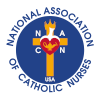Dr. Marie T. Hilliard, MS, MA, JCL, PhD, RN
Chair, CICIAMS Ethics Committee
A Catholic health care worker has a unique vocational call. Among all the functions carried out on behalf
of our ministry, for which each of us has been commissioned by our baptism, the most important
vocational call of this ministry is that of accompaniment. Pope Francis often has spoken of this
obligation.
When speaking to the bishops of Brazil while in Rio de Janeiro for World Youth Day in 2013, Pope Francis
[addressing the plight of refugees] said:
[W]e need a church capable of walking at people’s side, of doing more than simply listening to
them; a church that accompanies them on their journey; a church able to make sense of the
“night” …. But we need to know how to interpret, with courage, the larger picture.
There is much evidence of the dark “night” engulfing vulnerable seekers of health care. Health care,
which by its very nature is a source of healing, has been contorted into a forum of death, through
abortion and physician-assisted suicide, and now euthanasia implemented on vulnerable persons no
longer able to speak for themselves. A eugenic culture prevails, and a secular relativism distorting the
value of human life and the sacredness of the health care ministry, has replaced the very foundation of
health care grounded in natural moral law. Ironically, this secular relativism does not tolerate the views
of those who consistently defend the sacredness of human life. There is a growing intolerance toward
Catholic health care workers exercising accompaniment with the vulnerable who suffer, rather than
cooperating in the deliberate elimination of the suffer to end suffering. However, we will never
eliminate suffering, and the harder we try, the greater the number of victims of this professional
movement to eliminate suffering by eliminating the sufferer. To this end the United States Conference
of Catholic Bishops is calling for support for the Conscience Protection Act of 2017 (H.R. 644). Similar
needs to protect the free exercise of the religion of health care workers are in evidence throughout the
world. Health care workers are being forced to choose between their faith and their profession.
Yet our obligation to accompany those we serve in the dark night continues: not only to alleviate their
suffering while respecting their lives and dignity, but to help them find meaning in their suffering. That
is the unique role of the Catholic health care provider. We are much more than dispensers of expert
healing skills. We are bringing Christ to those we serve, to help them “to interpret, with courage, the
larger picture” imbedded in their physical, emotional, and spiritual suffering. Suffering is composed of
far more than physical, or even psychological pain. With all the unknowns experienced in some of those
most difficult situations, such as the baby Charlie Gard case, Catholic health care workers have much to
offer. Patients and families struggle with why God allows suffering, and often even experience a false
sense of guilt. Our healing hands do far more than accompany sufferers physically, but emotionally and
spiritually, helping them find meaning in intractable suffering: suffering can be redemptive. This is our
unique additional contribution to health care which we provide as Catholic ministers of healing; we must
be free from coercion to enable us to provide it.
NB: Numerous resources are available to help Catholic providers address the ethical dilemmas they face:
CICIAMS Ethics Committee (ciciams@eircom.net), as well as The National Catholic Bioethics Center
(USA, but accepting all questioners: consults@ncbcenter.org).
